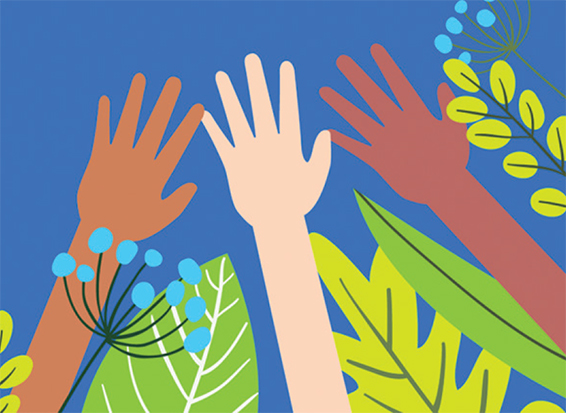 Caring, relationality, cooperation and consciousness — these are some of the virtues that Pope Francis calls us to exercise in his encyclical Laudato Si, On Care of Our Common Home. In the five years that the encyclical has been existent, people across the world have been challenged and inspired to utilize these virtues in improving their relationships with God, with creation and with one another — in equal measure. Understanding our interconnectedness and acting to bring these relationships into true balance is the heart of the message of Laudato Si.
Caring, relationality, cooperation and consciousness — these are some of the virtues that Pope Francis calls us to exercise in his encyclical Laudato Si, On Care of Our Common Home. In the five years that the encyclical has been existent, people across the world have been challenged and inspired to utilize these virtues in improving their relationships with God, with creation and with one another — in equal measure. Understanding our interconnectedness and acting to bring these relationships into true balance is the heart of the message of Laudato Si.
Laudato Si shines a light on Scripture, Catholic Social Teaching, and the wisdom of the ages in highlighting how God intends for humans and creation to coexist. We have all the knowledge we need in these teachings and in one another to bring about a new world order that better addresses and prevents the societal and environmental degradations and crises of our times.
This new order or model, rooted in local communities, must consider the common good. One where we meet one another, share suffering, and contribute our talents and resources, including reducing our own consumption, for the benefit of all. A model where nature and life are not commercialized and commodified.
“For Christians, interest and concern for the promotion and respect of human rights, both individual and collective, is not optional. Human beings are created in the image and likeness of God the Creator, and their dignity is inviolable. That is why the defense and promotion of human rights is not merely a political duty or a social task, but also and above all a requirement of faith” (Synod of Bishops for the Pan-Amazon Region, 2019).
Defending human rights requires that we hear the cry of the oppressed — the cry of the blood. In the aftermath of George Floyd’s murder, the cry of the persecuted is amplified by the millions of people protesting around the world. In order to live out Laudato Si, and our Gospel call, white people and their institutions in particular, including us Sisters of the Precious Blood, as well as our Catholic Church, need to examine our implicit biases, our privilege and our contributions to systemic racism. We then need to take meaningful action to reverse the harm that we inflict upon others and to reconcile with our brothers and sisters in Christ.
Our Church should identify where it stands with every injustice and its place must always be with the poor.
The same method is appropriate for those suffering from the coronavirus pandemic, which likely began in the food markets in Wuhan, China, due to people living in poverty. The pandemic has exposed the fragility of the human condition, of the climate, of institutions, of governments. It has exposed inequalities as manifested by those most affected by the virus — the poor and the vulnerable. And it has illustrated our dependency on one another and the inequalities in health care, supply chains and commercial markets and industries.
Respecting human life means respecting all God’s creation, of which we share a universal communion, united in love. “When our hearts are authentically open to universal communion, this sense of fraternity excludes nothing and no one,” (L.S. 92).
Cardinal Peter Turkson, prefect of the Dicastery for Promoting Integral Human Development, said that creation is an act of God, and because it is, we are invited to consider how creation leads us in our worship and our recognition of who God is. The natural world is a continuing revelation of the Divine. “Paying attention to this manifestation, we learn to see ourselves in relation to all other creatures: ‘I express myself in expressing the world; in my effort to decipher the sacredness of the world, I explore my own,’” (Paul Ricoeur, quoted in L.S. 85).
Cardinal Turkson further explained that our relationship to creation is one of kinship, something to be kept, i.e., cared for, just as we keep our brother and sister. And, every activity of the human person ultimately must have a sense of worshipping God, giving glory to Him.
The good news of Laudato Si is that if we reflect the caring and the love of the Father, it will lead to action. Encounter, integrality, community, relationship — these are the things that will lead to our conversion — and to fullness of life — as Laudato Si call us to. As we move past the fifth anniversary of the encyclical, this is a time for us to grow in faith and spirituality, and for our Church to be a model for sustainable growth, so that all people may have the freedom to become who God intends them to be.
Laudato Si is the light of hope in difficult times. We take comfort in knowing that “The God who created the universe out of nothing can also intervene in this world and overcome every form of evil. Injustice is not invincible” (L.S. 74).
Story by Colleen Kammer




